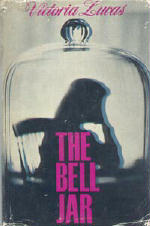 Elizabeth Sigmund, once a close friend of Sylvia Plath, blasts all the mythmaking in the film Sylvia, according to an article in The Independent. I had intended to post a Plath entry when the film burst onto the scene in this country this fall. The Plath legendry has interested me since I was a student at Wellesley High School (Massachusetts), which Plath attended two decades before I did. It would have been hard not to be curious, since I sat day after day in the English class of the teacher she describes so vividly in The Bell Jar. My classmates badgered Mr. Crockett (first name, Wilbury) all year to talk about her. He refused each time, turning us immediately to the work at hand. But one spring morning he relented, and told us a story that is not in any biography that I'm aware of.
Elizabeth Sigmund, once a close friend of Sylvia Plath, blasts all the mythmaking in the film Sylvia, according to an article in The Independent. I had intended to post a Plath entry when the film burst onto the scene in this country this fall. The Plath legendry has interested me since I was a student at Wellesley High School (Massachusetts), which Plath attended two decades before I did. It would have been hard not to be curious, since I sat day after day in the English class of the teacher she describes so vividly in The Bell Jar. My classmates badgered Mr. Crockett (first name, Wilbury) all year to talk about her. He refused each time, turning us immediately to the work at hand. But one spring morning he relented, and told us a story that is not in any biography that I'm aware of.
One afternoon, in the course of analyzing a poem that described the colors of dawn's first light, Plath challenged the poet's view of the early morning, declaring that the first light is always gray. Mr. Crockett disagreed with her, and they argued back and forth, probably with input from other members of the class. By the end of the class, Plath had not changed Mr. Crockett's mind. Sometime after class, Plath gathered a number of her classmates who agreed to meet before dawn to descend on Mr. Crockett's house. The next morning, he was stirred from a deep sleep to answer the door. It was still completely dark. Plath and her friends insisted he dress and join them, which he did. They waited for dawn and as bewildering as it was to him, the earliest light was gray.
I think I love this story for the way it shows that Plath trusted her reality, her perceptions of the world, to such an extent that she, as a girl living in the socially repressive world of 1949 Wellesley, had the courage to support them.

0 Comments:
Post a Comment
<< Home